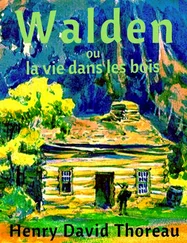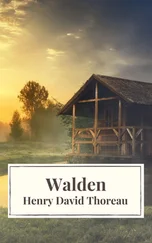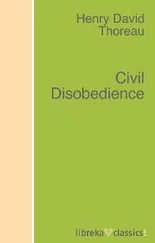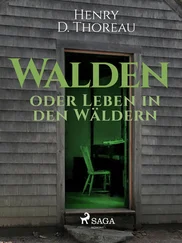One afternoon, near the end of the first summer, when I went to the village to get a shoe from the cobbler’s, I was seized and put into jail, because, as I have elsewhere related, I did not pay a tax to, or recognize the authority of, the State which buys and sells men, women, and children, like cattle, at the door of its senate-house. I had gone down to the woods for other purposes. But, wherever a man goes, men will pursue and paw him with their dirty institutions, and, if they can, constrain him to belong to their desperate odd-fellow society. It is true, I might have resisted forcibly with more or less effect, might have run “amok” against society; but I preferred that society should run “amok” against me, it being the desperate party. However, I was released the next day, obtained my mended shoe, and returned to the woods in season to get my dinner of huckleberries on Fair Haven Hill. I was never molested by any person but those who represented the State. I had no lock nor bolt but for the desk which held my papers, not even a nail to put over my latch or windows. I never fastened my door night or day, though I was to be absent several days; not even when the next fall I spent a fortnight in the woods of Maine. And yet my house was more respected than if it had been surrounded by a file of soldiers. The tired rambler could rest and warm himself by my fire, the literary amuse himself with the few books on my table, or the curious, by opening my closet door, see what was left of my dinner, and what prospect I had of a supper. Yet, though many people of every class came this way to the pond, I suffered no serious inconvenience from these sources, and I never missed anything but one small book, a volume of Homer, which perhaps was improperly gilded, and this I trust a soldier of our camp has found by this time. I am convinced, that if all men were to live as simply as I then did, thieving and robbery would be unknown. These take place only in communities where some have got more than is sufficient while others have not enough. The Pope’s Homers would soon get properly distributed.
“Nec bella fuerunt,
Faginus astabat dum scyphus ante dapes.”
“Nor wars did men molest,
When only beechen bowls were in request.”
“You who govern public affairs, what need have you to employ punishments? Love virtue, and the people will be virtuous. The virtues of a superior man are like the wind; the virtues of a common man are like the grass — I the grass, when the wind passes over it, bends.”
Table of Contents
Sometimes, having had a surfeit of human society and gossip, and worn out all my village friends, I rambled still farther westward than I habitually dwell, into yet more unfrequented parts of the town, “to fresh woods and pastures new,” or, while the sun was setting, made my supper of huckleberries and blueberries on Fair Haven Hill, and laid up a store for several days. The fruits do not yield their true flavor to the purchaser of them, nor to him who raises them for the market. There is but one way to obtain it, yet few take that way. If you would know the flavor of huckleberries, ask the cowboy or the partridge. It is a vulgar error to suppose that you have tasted huckleberries who never plucked them. A huckleberry never reaches Boston; they have not been known there since they grew on her three hills. The ambrosial and essential part of the fruit is lost with the bloom which is rubbed off in the market cart, and they become mere provender. As long as Eternal Justice reigns, not one innocent huckleberry can be transported thither from the country’s hills.
Occasionally, after my hoeing was done for the day, I joined some impatient companion who had been fishing on the pond since morning, as silent and motionless as a duck or a floating leaf, and, after practising various kinds of philosophy, had concluded commonly, by the time I arrived, that he belonged to the ancient sect of Coenobites. There was one older man, an excellent fisher and skilled in all kinds of woodcraft, who was pleased to look upon my house as a building erected for the convenience of fishermen; and I was equally pleased when he sat in my doorway to arrange his lines. Once in a while we sat together on the pond, he at one end of the boat, and I at the other; but not many words passed between us, for he had grown deaf in his later years, but he occasionally hummed a psalm, which harmonized well enough with my philosophy. Our intercourse was thus altogether one of unbroken harmony, far more pleasing to remember than if it had been carried on by speech. When, as was commonly the case, I had none to commune with, I used to raise the echoes by striking with a paddle on the side of my boat, filling the surrounding woods with circling and dilating sound, stirring them up as the keeper of a menagerie his wild beasts, until I elicited a growl from every wooded vale and hillside.
In warm evenings I frequently sat in the boat playing the flute, and saw the perch, which I seem to have charmed, hovering around me, and the moon travelling over the ribbed bottom, which was strewed with the wrecks of the forest. Formerly I had come to this pond adventurously, from time to time, in dark summer nights, with a companion, and, making a fire close to the water’s edge, which we thought attracted the fishes, we caught pouts with a bunch of worms strung on a thread, and when we had done, far in the night, threw the burning brands high into the air like skyrockets, which, coming down into the pond, were quenched with a loud hissing, and we were suddenly groping in total darkness. Through this, whistling a tune, we took our way to the haunts of men again. But now I had made my home by the shore.
Sometimes, after staying in a village parlor till the family had all retired, I have returned to the woods, and, partly with a view to the next day’s dinner, spent the hours of midnight fishing from a boat by moonlight, serenaded by owls and foxes, and hearing, from time to time, the creaking note of some unknown bird close at hand. These experiences were very memorable and valuable to me — anchored in forty feet of water, and twenty or thirty rods from the shore, surrounded sometimes by thousands of small perch and shiners, dimpling the surface with their tails in the moonlight, and communicating by a long flaxen line with mysterious nocturnal fishes which had their dwelling forty feet below, or sometimes dragging sixty feet of line about the pond as I drifted in the gentle night breeze, now and then feeling a slight vibration along it, indicative of some life prowling about its extremity, of dull uncertain blundering purpose there, and slow to make up its mind. At length you slowly raise, pulling hand over hand, some horned pout squeaking and squirming to the upper air. It was very queer, especially in dark nights, when your thoughts had wandered to vast and cosmogonal themes in other spheres, to feel this faint jerk, which came to interrupt your dreams and link you to Nature again. It seemed as if I might next cast my line upward into the air, as well as downward into this element, which was scarcely more dense. Thus I caught two fishes as it were with one hook.
The scenery of Walden is on a humble scale, and, though very beautiful, does not approach to grandeur, nor can it much concern one who has not long frequented it or lived by its shore; yet this pond is so remarkable for its depth and purity as to merit a particular description. It is a clear and deep green well, half a mile long and a mile and three quarters in circumference, and contains about sixty-one and a half acres; a perennial spring in the midst of pine and oak woods, without any visible inlet or outlet except by the clouds and evaporation. The surrounding hills rise abruptly from the water to the height of forty to eighty feet, though on the southeast and east they attain to about one hundred and one hundred and fifty feet respectively, within a quarter and a third of a mile. They are exclusively woodland. All our Concord waters have two colors at least; one when viewed at a distance, and another, more proper, close at hand. The first depends more on the light, and follows the sky. In clear weather, in summer, they appear blue at a little distance, especially if agitated, and at a great distance all appear alike. In stormy weather they are sometimes of a dark slate-color. The sea, however, is said to be blue one day and green another without any perceptible change in the atmosphere. I have seen our river, when, the landscape being covered with snow, both water and ice were almost as green as grass. Some consider blue “to be the color of pure water, whether liquid or solid.” But, looking directly down into our waters from a boat, they are seen to be of very different colors. Walden is blue at one time and green at another, even from the same point of view. Lying between the earth and the heavens, it partakes of the color of both. Viewed from a hilltop it reflects the color of the sky; but near at hand it is of a yellowish tint next the shore where you can see the sand, then a light green, which gradually deepens to a uniform dark green in the body of the pond. In some lights, viewed even from a hilltop, it is of a vivid green next the shore. Some have referred this to the reflection of the verdure; but it is equally green there against the railroad sandbank, and in the spring, before the leaves are expanded, and it may be simply the result of the prevailing blue mixed with the yellow of the sand. Such is the color of its iris. This is that portion, also, where in the spring, the ice being warmed by the heat of the sun reflected from the bottom, and also transmitted through the earth, melts first and forms a narrow canal about the still frozen middle. Like the rest of our waters, when much agitated, in clear weather, so that the surface of the waves may reflect the sky at the right angle, or because there is more light mixed with it, it appears at a little distance of a darker blue than the sky itself; and at such a time, being on its surface, and looking with divided vision, so as to see the reflection, I have discerned a matchless and indescribable light blue, such as watered or changeable silks and sword blades suggest, more cerulean than the sky itself, alternating with the original dark green on the opposite sides of the waves, which last appeared but muddy in comparison. It is a vitreous greenish blue, as I remember it, like those patches of the winter sky seen through cloud vistas in the west before sundown. Yet a single glass of its water held up to the light is as colorless as an equal quantity of air. It is well known that a large plate of glass will have a green tint, owing, as the makers say, to its “body,” but a small piece of the same will be colorless. How large a body of Walden water would be required to reflect a green tint I have never proved. The water of our river is black or a very dark brown to one looking directly down on it, and, like that of most ponds, imparts to the body of one bathing in it a yellowish tinge; but this water is of such crystalline purity that the body of the bather appears of an alabaster whiteness, still more unnatural, which, as the limbs are magnified and distorted withal, produces a monstrous effect, making fit studies for a Michael Angelo.
Читать дальше












